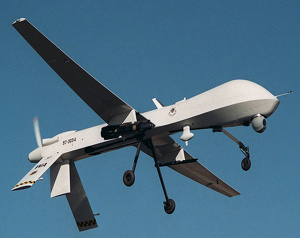The Rise of the Machines
Improvements in the technology behind the predator drone are advancing at a rate faster than a half-naked Arnold Schwarzenegger fleeing extra-terrestrial assassins in an alien jungle. Two new books bring us up to date. (more)
Improvements in the technology behind the predator drone are advancing at a rate faster than a half-naked Arnold Schwarzenegger fleeing extra-terrestrial assassins in an alien jungle. Two new books bring us up to date.
Writing for The New York Review of Books, Washington editor for Radio Free Europe Christian Caryl reviews two volumes on the state of the real-life predators darkening the skies over the Middle East, the Mexican-American border and other parts of the world.
The lingering question, which may be answered sooner than many of us suppose, is what levels of autonomy these mindless killers will achieve as technological advances enable them to shed their human operators, and what kind of global legal system should be designed to ensure the forces directing their missions do so with accountability. –ARK
Your support matters…The New York Review of Books:
In fact, as [author Peter] Singer shows, the ethical and legal implications of the new technology already go far beyond the relatively circumscribed issue of targeted killing. Military robots are on their way to developing considerable autonomy. As noted earlier, UAVs can already take off, land, and fly themselves without human intervention. Targeting is still the exclusive preserve of the human operator—but how long will this remain the case? As sensors become more powerful and diverse, the amount of data gathered by the machines is increasing exponentially, and soon the volume and velocity of information will far exceed the controller’s capacity to process it all in real time, meaning that more and more decision-making will be left to the robot.
A move is already underway toward systems that allow a single operator to handle multiple drones simultaneously, and this, too, will tend to push the technology toward greater autonomy. We are not far from the day when it will become manifest that our mechanical warriors are better at protecting the lives of our troops than any human soldier, and once that happens the pressure to let robots take the shot will be very hard to resist. Pentagon officials who have been interviewed on the subject predictably insist that the decision to kill will never be ceded to a machine. That is reassuring. Still, this is an easy thing to say at a point when robots are not yet in the position to take the initiative against the enemy on a battlefield. Soon, much sooner than most of us realize, they will be able to do just that.
Independent journalism is under threat and overshadowed by heavily funded mainstream media.
You can help level the playing field. Become a member.
Your tax-deductible contribution keeps us digging beneath the headlines to give you thought-provoking, investigative reporting and analysis that unearths what's really happening- without compromise.
Give today to support our courageous, independent journalists.






You need to be a supporter to comment.
There are currently no responses to this article.
Be the first to respond.